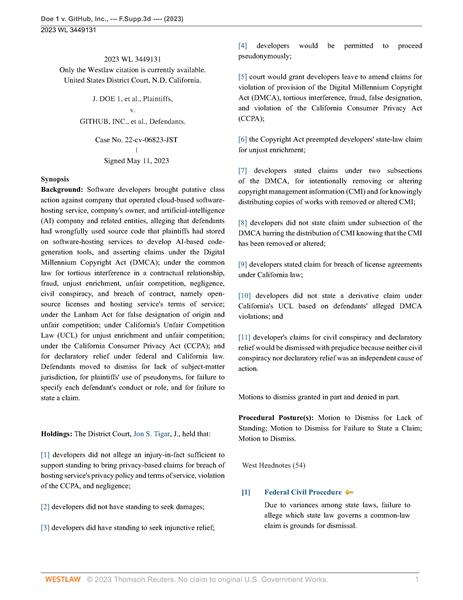By Barry Werbin
On May 11, 2023, the N.D. Cal. decided the motion to dismiss filed by the defendants (GitHub, Microsoft, OpenAI) in this class action, ruling that (i) the class-action plaintiffs’ claims for violation of Sections 1202(a) and 1202(b)(2) of the DMCA, tortious interference in a contractual relationship, fraud, false designation of origin, unjust enrichment, unfair competition, breach of the GitHub Privacy Policy and Terms of Service, violation of the CCPA, and negligence were dismissed with leave to amend; (ii) plaintiffs’ claims for civil conspiracy and declaratory relief were dismissed with prejudice; and (iii) plaintiffs’ California Unfair Competition Law claims predicated on violation of Sections 1202(b)(1) and (b)(3) of the DMCA and the claims alleged under those DMCA subsections remained (motion denied on that prong).
On the divided DMCA claims, the court ruled that the plaintiff developers stated claims under two subsections of the DMCA, for intentionally removing or altering copyright management information (CMI) and for knowingly distributing copies of works with removed or altered CMI. The developers did not state a claim, however, under other subsections of the DMCA barring the distribution of CMI, knowing that the CMI had been removed or altered based on unsupported allegations respecting false descriptions of authorship or source (“Plaintiffs do not identity the assertions, implications, and/or false descriptions of authorship or source at issue, nor do they plead facts that suggest such unidentified statements could constitute CMI.”).
The surviving DMCA claims are based on allegations that defendants used the plaintiffs’ code as input to models for creating AI-based code-generation tools, but trained the models to ignore or remove CMI found in developers' code, thus violating the DMCA’s prohibition on intentionally removing or altering CMI.
The court also found that the Copyright Act preempted the plaintiff developers' state-law claim for unjust enrichment: “Plaintiffs do not allege that Defendants' use of Plaintiffs' code for training purposes violated their rights. Rather, Plaintiffs base their unjust enrichment claim on Defendants' reproduction of Plaintiffs' code as output and Defendants' preparation of derivative works, both of which are rights protected under the Copyright Act….” Note that the Complaint did not allege copyright infringement.
A copy of the decision is attached.
